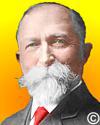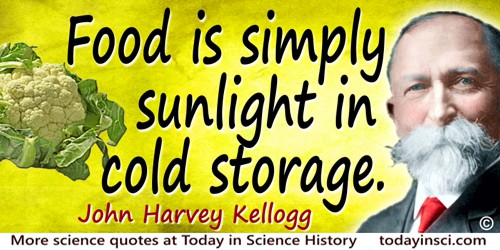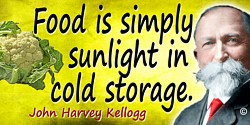 (source)
(source)
|
John Harvey Kellogg
(26 Feb 1852 - 14 Dec 1943)
American physician and health-food pioneer whose development of dry breakfast cereals was largely responsible for the creation of the flaked-cereal industry.
|
Science Quotes by John Harvey Kellogg (9 quotes)
A dead cow or sheep lying in a pasture is recognized as carrion. The same sort of a carcass dressed and hung up in a butcher's stall passes as food.
— John Harvey Kellogg
This quote is consistent in sentiment with others documented as by Kellogg, but Webmaster has so far not found the original source for this one. If you know the primary source of this quote, please contact Webmaster.
Alcoholism, the opium habit and tobaccoism are a trio of poison habits which have been weighty handicaps to human progress during the last three centuries. In the United States, the subtle spell of opium has been broken by restrictive legislation; the grip of the rum demon has been loosened by the Prohibition Amendment to the Constitution, but the tobacco habit still maintains its strangle-hold and more than one hundred million victims of tobaccoism daily burn incense to the smoke god.
— John Harvey Kellogg
In Tobaccoism: or, How Tobacco Kills (1922), Preface, 7.
All fresh meat is eaten in a state of decay. The process may not have proceeded so far that the dull human nose can discover it, but a carrion bird or a carrion fly can smell it from afar.
— John Harvey Kellogg
In New Dietetics: What to Eat and How (1921), 384.
All the inventions and devices ever constructed by the human hand or conceived by the human mind, no matter how delicate, how intricate and complicated, are simple, childish toys compared with that most marvelously wrought mechanism, the human body. Its parts are far more delicate, and their mutual adjustments infinitely more accurate, than are those of the most perfect chronometer ever made.
— John Harvey Kellogg
In Plain Facts For Old and Young: Embracing the Natural History and Hygiene of Organic Life (1879, 1887), Revised Ed., 332.
Hamburger steak is carrion, and quite unfit for food except by a turkey buzzard, a hyena, or some other scavenger.
— John Harvey Kellogg
In New Dietetics: What to Eat and How (1921),, 469.
It is sunlight in modified form which turns all the windmills and water wheels and the machinery which they drive. It is the energy derived from coal and petroleum (fossil sunlight) which propels our steam and gas engines, our locomotives and automobiles. ... Food is simply sunlight in cold storage.
— John Harvey Kellogg
In New Dietetics: What to Eat and How (1921), 29.
To please men and to kill parasites are the only uses tobacco—its ultimate effects are the same in both cases.
— John Harvey Kellogg
In Tobaccoism: or, How Tobacco Kills (1922), Preface, 7.
Tobacco has not yet been fully tried before the bar of science. But the tribunal has been prepared and the gathering of evidence has begun and when the final verdict is rendered, it will appear that tobacco is evil and only evil; that as a drug it is far more deadly than alcohol, killing in a dose a thousand times smaller, and that it does not possess a single one of the quasi merits of alcohol.
— John Harvey Kellogg
In Tobaccoism: or, How Tobacco Kills (1922), Preface, 8.
Tobacco, in its various forms, is one of the most mischievous of all drugs. There is perhaps no other drug which injures the body in so many ways and so universally as does tobacco. Some drugs offer a small degree of compensation for the evil effects which they produce; but tobacco has not a single redeeming feature and gives nothing in return.
— John Harvey Kellogg
In Tobaccoism: or, How Tobacco Kills (1922), Preface, 7.
See also:
- 26 Feb - short biography, births, deaths and events on date of Kellogg's birth.
- John Harvey Kellogg - context of quote “Food is simply” - Medium image (500 x 250 px)
- John Harvey Kellogg - context of quote “Food is simply” - Large image (800 x 400 px)


 In science it often happens that scientists say, 'You know that's a really good argument; my position is mistaken,' and then they would actually change their minds and you never hear that old view from them again. They really do it. It doesn't happen as often as it should, because scientists are human and change is sometimes painful. But it happens every day. I cannot recall the last time something like that happened in politics or religion.
(1987) --
In science it often happens that scientists say, 'You know that's a really good argument; my position is mistaken,' and then they would actually change their minds and you never hear that old view from them again. They really do it. It doesn't happen as often as it should, because scientists are human and change is sometimes painful. But it happens every day. I cannot recall the last time something like that happened in politics or religion.
(1987) -- 


